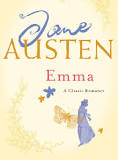Emma Page #38
Emma, by Jane Austen, is a novel about youthful hubris and the perils of misconstrued romance. The story takes place in the fictional village of Highbury and the surrounding estates of Hartfield, Randalls, and Donwell Abbey and involves the relationships among individuals in those locations consisting of "3 or 4 families in a country village". The novel was first published in December 1815 while the author was alive, with its title page listing a publication date of 1816. As in her other novels, Austen explores the concerns and difficulties of genteel women living in Georgian–Regency England; she also creates a lively comedy of manners among her characters and depicts issues of marriage, gender, age, and social status.
“That's easily said, and easily felt by you, who have always been your own master. You are the worst judge in the world, Mr. Knightley, of the difficulties of dependence. You do not know what it is to have tempers to manage.” “It is not to be conceived that a man of three or four-and-twenty should not have liberty of mind or limb to that amount. He cannot want money--he cannot want leisure. We know, on the contrary, that he has so much of both, that he is glad to get rid of them at the idlest haunts in the kingdom. We hear of him for ever at some watering-place or other. A little while ago, he was at Weymouth. This proves that he can leave the Churchills.” “Yes, sometimes he can.” “And those times are whenever he thinks it worth his while; whenever there is any temptation of pleasure.” “It is very unfair to judge of any body's conduct, without an intimate knowledge of their situation. Nobody, who has not been in the interior of a family, can say what the difficulties of any individual of that family may be. We ought to be acquainted with Enscombe, and with Mrs. Churchill's temper, before we pretend to decide upon what her nephew can do. He may, at times, be able to do a great deal more than he can at others.” “There is one thing, Emma, which a man can always do, if he chuses, and that is, his duty; not by manoeuvring and finessing, but by vigour and resolution. It is Frank Churchill's duty to pay this attention to his father. He knows it to be so, by his promises and messages; but if he wished to do it, it might be done. A man who felt rightly would say at once, simply and resolutely, to Mrs. Churchill--'Every sacrifice of mere pleasure you will always find me ready to make to your convenience; but I must go and see my father immediately. I know he would be hurt by my failing in such a mark of respect to him on the present occasion. I shall, therefore, set off to-morrow.'--If he would say so to her at once, in the tone of decision becoming a man, there would be no opposition made to his going.” “No,” said Emma, laughing; “but perhaps there might be some made to his coming back again. Such language for a young man entirely dependent, to use!--Nobody but you, Mr. Knightley, would imagine it possible. But you have not an idea of what is requisite in situations directly opposite to your own. Mr. Frank Churchill to be making such a speech as that to the uncle and aunt, who have brought him up, and are to provide for him!--Standing up in the middle of the room, I suppose, and speaking as loud as he could!--How can you imagine such conduct practicable?” “Depend upon it, Emma, a sensible man would find no difficulty in it. He would feel himself in the right; and the declaration--made, of course, as a man of sense would make it, in a proper manner--would do him more good, raise him higher, fix his interest stronger with the people he depended on, than all that a line of shifts and expedients can ever do. Respect would be added to affection. They would feel that they could trust him; that the nephew who had done rightly by his father, would do rightly by them; for they know, as well as he does, as well as all the world must know, that he ought to pay this visit to his father; and while meanly exerting their power to delay it, are in their hearts not thinking the better of him for submitting to their whims. Respect for right conduct is felt by every body. If he would act in this sort of manner, on principle, consistently, regularly, their little minds would bend to his.” “I rather doubt that. You are very fond of bending little minds; but where little minds belong to rich people in authority, I think they have a knack of swelling out, till they are quite as unmanageable as great ones. I can imagine, that if you, as you are, Mr. Knightley, were to be transported and placed all at once in Mr. Frank Churchill's situation, you would be able to say and do just what you have been recommending for him; and it might have a very good effect. The Churchills might not have a word to say in return; but then, you would have no habits of early obedience and long observance to break through. To him who has, it might not be so easy to burst forth at once into perfect independence, and set all their claims on his gratitude and regard at nought. He may have as strong a sense of what would be right, as you can have, without being so equal, under particular circumstances, to act up to it.” “Then it would not be so strong a sense. If it failed to produce equal exertion, it could not be an equal conviction.” “Oh, the difference of situation and habit! I wish you would try to understand what an amiable young man may be likely to feel in directly opposing those, whom as child and boy he has been looking up to all his life.” “Our amiable young man is a very weak young man, if this be the first occasion of his carrying through a resolution to do right against the will of others. It ought to have been a habit with him by this time, of following his duty, instead of consulting expediency. I can allow for the fears of the child, but not of the man. As he became rational, he ought to have roused himself and shaken off all that was unworthy in their authority. He ought to have opposed the first attempt on their side to make him slight his father. Had he begun as he ought, there would have been no difficulty now.” “We shall never agree about him,” cried Emma; “but that is nothing extraordinary. I have not the least idea of his being a weak young man: I feel sure that he is not. Mr. Weston would not be blind to folly, though in his own son; but he is very likely to have a more yielding, complying, mild disposition than would suit your notions of man's perfection. I dare say he has; and though it may cut him off from some advantages, it will secure him many others.” “Yes; all the advantages of sitting still when he ought to move, and of leading a life of mere idle pleasure, and fancying himself extremely expert in finding excuses for it. He can sit down and write a fine flourishing letter, full of professions and falsehoods, and persuade himself that he has hit upon the very best method in the world of preserving peace at home and preventing his father's having any right to complain. His letters disgust me.” “Your feelings are singular. They seem to satisfy every body else.” “I suspect they do not satisfy Mrs. Weston. They hardly can satisfy a woman of her good sense and quick feelings: standing in a mother's place, but without a mother's affection to blind her. It is on her account that attention to Randalls is doubly due, and she must doubly feel the omission. Had she been a person of consequence herself, he would have come I dare say; and it would not have signified whether he did or no. Can you think your friend behindhand in these sort of considerations? Do you suppose she does not often say all this to herself? No, Emma, your amiable young man can be amiable only in French, not in English. He may be very 'amiable,' have very good manners, and be very agreeable; but he can have no English delicacy towards the feelings of other people: nothing really amiable about him.”
Translation
Translate and read this book in other languages:
Select another language:
- - Select -
- 简体中文 (Chinese - Simplified)
- 繁體中文 (Chinese - Traditional)
- Español (Spanish)
- Esperanto (Esperanto)
- 日本語 (Japanese)
- Português (Portuguese)
- Deutsch (German)
- العربية (Arabic)
- Français (French)
- Русский (Russian)
- ಕನ್ನಡ (Kannada)
- 한국어 (Korean)
- עברית (Hebrew)
- Gaeilge (Irish)
- Українська (Ukrainian)
- اردو (Urdu)
- Magyar (Hungarian)
- मानक हिन्दी (Hindi)
- Indonesia (Indonesian)
- Italiano (Italian)
- தமிழ் (Tamil)
- Türkçe (Turkish)
- తెలుగు (Telugu)
- ภาษาไทย (Thai)
- Tiếng Việt (Vietnamese)
- Čeština (Czech)
- Polski (Polish)
- Bahasa Indonesia (Indonesian)
- Românește (Romanian)
- Nederlands (Dutch)
- Ελληνικά (Greek)
- Latinum (Latin)
- Svenska (Swedish)
- Dansk (Danish)
- Suomi (Finnish)
- فارسی (Persian)
- ייִדיש (Yiddish)
- հայերեն (Armenian)
- Norsk (Norwegian)
- English (English)
Citation
Use the citation below to add this book to your bibliography:
Style:MLAChicagoAPA
"Emma Books." Literature.com. STANDS4 LLC, 2025. Web. 11 Jan. 2025. <https://www.literature.com/book/emma_29>.




Discuss this Emma book with the community:
Report Comment
We're doing our best to make sure our content is useful, accurate and safe.
If by any chance you spot an inappropriate comment while navigating through our website please use this form to let us know, and we'll take care of it shortly.
Attachment
You need to be logged in to favorite.
Log In